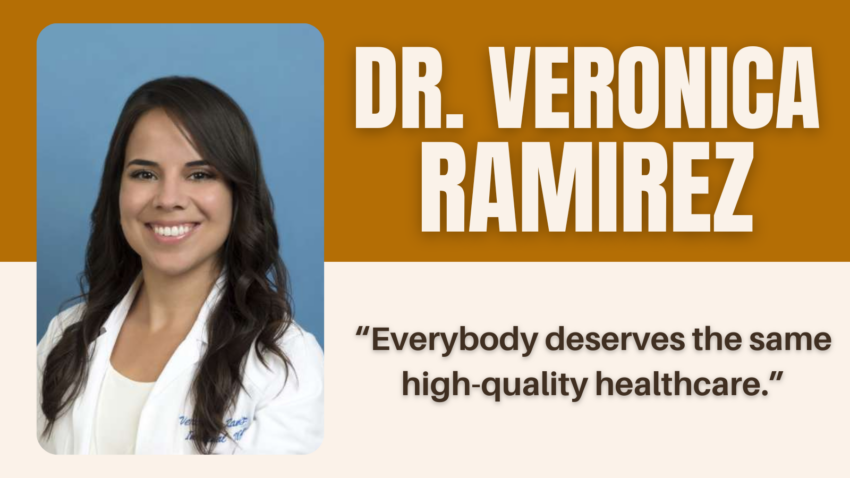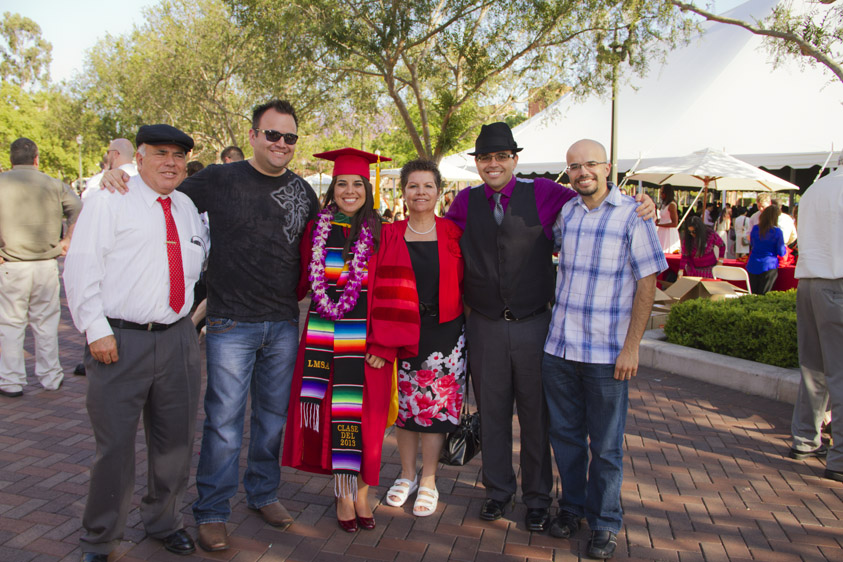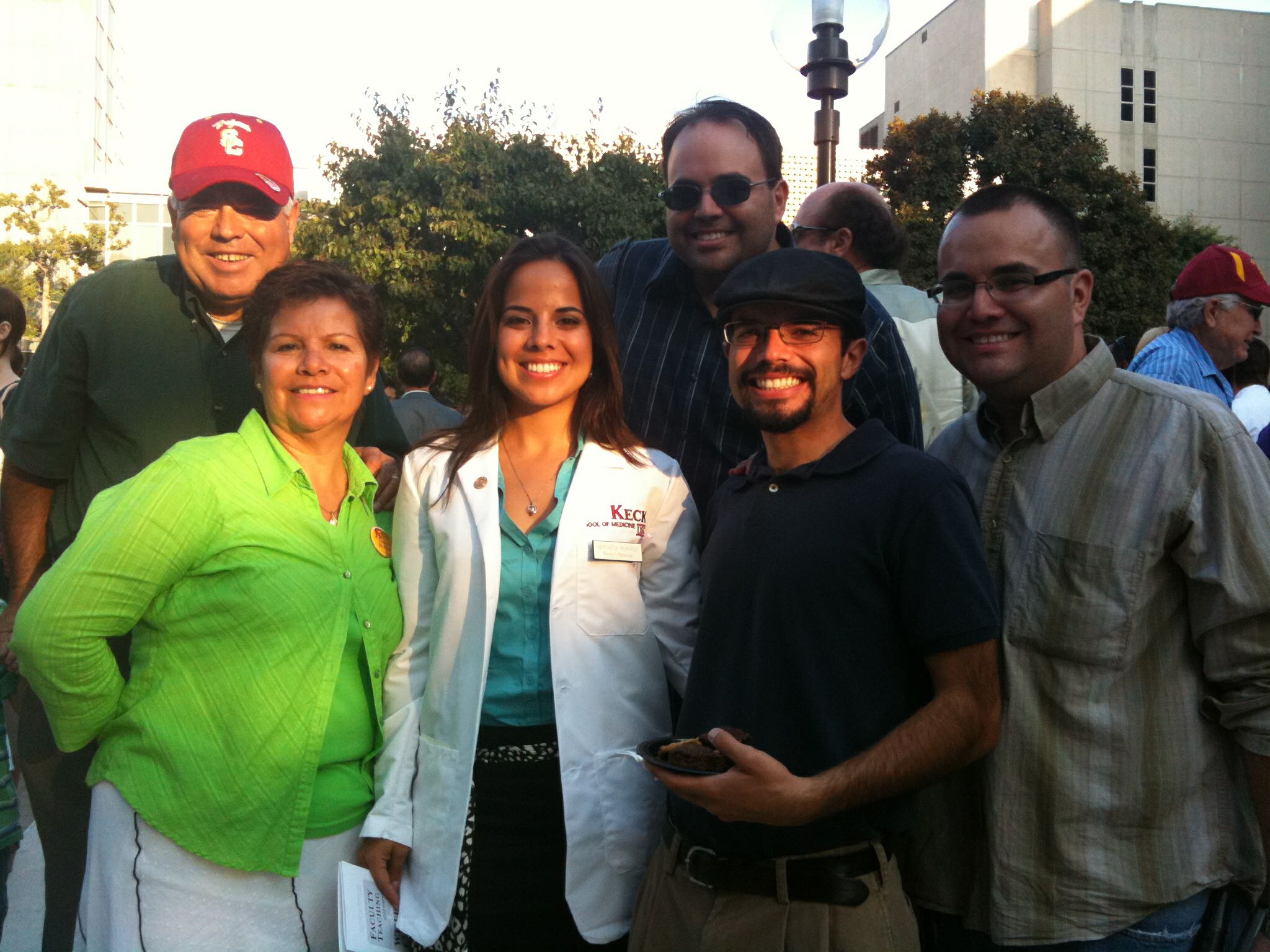
Share On Social!
Dr. Veronica Ramirez is the first physician in her family.
The youngest of four children, Ramirez grew up in Escondido, California, with an interest in service. She watched her parents generously help others and give back to the community.
So, when Ramirez’s aunt, who she was very close to, was diagnosed with inflammatory breast cancer in her late 30s, Ramirez was motivated to take her service orientation to a new level – medical school – to help those like her aunt.
“Seeing her go through that experience inspired me to want to go into medicine to help others,” Ramirez said.
Ramirez has done more than achieve her goal.
As an assistant clinical professor at the David Geffen School of Medicine at UCLA, a hospitalist with UCLA Health, and a fellow with the National Hispanic Medical Association (NHMA), she is delivering culturally competent care and practicing infection control to prevent the spread of disease.
Discovering Her Passion
Ramirez began her journey as an undergraduate at Stanford University, studying human biology and minoring in dance.
She got involved on a childhood obesity prevention study that aimed to reduce rates of childhood obesity in Latina girls using afterschool dance programs.

To help prepare for medical school, she volunteered as a Spanish medical interpreter at the student-run free clinic at Stanford.
“There, I really saw how our most vulnerable populations really suffer from lack of access to primary care, lack of health insurance coverage. I also saw how what a difference it made for them to see somebody who spoke their language looks like them,” Ramirez said.
She applied and made it into Keck School of Medicine at USC.
Despite having a great family support system, Ramirez did experience pushback from others.
“One pre-med advisor in college said I was going to have a very hard time going to medical school. You kind of hang on to those words because it stinks when you have somebody who’s doubting your ability to do this,” Ramirez said.
Ramirez persevered and earned her doctoral degree.
She developed a passion for the work she was doing. Her patients’ positive response to her in the clinic made her eager to connect through shared language and cultural background.
“[Patients] would immediately see me and just kind of entrust that they could share with me everything that was affecting them, that they hadn’t felt comfortable telling a medical provider because they just didn’t know how to communicate that,” Ramirez said.
Helping Those in Need During the Pandemic
The COVID-19 pandemic brought big challenges for everyone.
That was especially true at one of Ramirez’s main clinic sites, Martin Luther King Jr. Community Hospital, located in an area of South Los Angeles that is medically underserved with a shortage of health professionals to serve the community.
“We were really serving the most vulnerable communities, our patients are living in multi-generational homes, they’re the bulk of our essential workers,” Ramirez said. “So, we were seeing them really suffer the consequences of not having access to health care, access to primary care, and unfortunately, not a lot of information and education getting to them.”
During this time, Ramirez became a role model for cultural representation and communication with patients to make sure they knew critical information.
Ramirez stepped out of the clinic to do community outreach, gave a community talk with the Mexican Consulate in Los Angeles to educate people about COVID-19 prevention, and helped set up pop-up vaccine clinics throughout South Los Angeles.
“All of the suffering that we had seen in the hospital, how could I channel that into making my community aware that this is what we were seeing on the frontline and how can we work together to protect themselves and protect the larger communities,” Ramirez said.
Ramirez also participated in media conferences with Telemundo and joined a Univision campaign to promote how vaccines can protect the Latino community.
This helped address rampant misinformation amid the pandemic.
“I really felt it was important for us to continue to address those concerns because we needed to be the ones who provided accurate evidence-based information to our communities to reduce the amount of misinformation that was out there,” Ramirez said.
The Importance of Everyday Infection Control
COVID-19 also highlighted the importance of infection control in healthcare settings.
While current cases haven’t reached the same highs as the height of the pandemic, Ramirez continues to emphasize infection control action in her work as a doctor.
This includes personal protective equipment (PPE) like gowns, gloves, and eye protection, source control, cleaning and disinfection, and knowing what to do when patients have a cough or rash.
Ramirez mentioned cleaning your hands as especially critical.
“I still wash my hands all the time,” she said. “It is protecting myself, but it’s really still protecting those around me who are more vulnerable.”
Keeping up with infection control information and protocols is equally important.
“Staying up to date with our infection control departments in each of my clinical sites – understanding what their updates are, what their protocols are – that still remains the same,” Ramirez said.
Ramirez uses the U.S. Centers for Disease Control and Prevention (CDC) to find updates on infection control practices and infectious diseases.
For example, check out these infection control micro-learns and educational content in Spanish.
“I would say [CDC] is sort of my go-to. Not only because of information for healthcare providers, but also resources for the general community in their language,” Ramirez said.
Advocating for Latino Medical Students
These days, Ramirez continues to serve her community.
To that end, she recently participated in the National Hispanic Medical Association (NHMA) Leadership Fellowship Program.
The program helps develop leadership skills among NHMA physician members to boost their eligibility for decision-making and executive positions across private, state, and federal levels. Fellows participate in NHMA’s annual meeting and weekly training sessions on different issues facing Latinos, including infection control.
As a fellow, Ramirez has built new collaborations with others in public health and health policy.
“I never imagined I would be in really sharing the same space as some of these very impactful members of our state and federal government and agencies,” Ramirez said.

Part of the program also includes working on a policy project with a team of NHMA fellows.
Ramirez and her team are focusing on financial barriers of Latino medical students.
Together, the team is brainstorming how to make medical education more financially accessible to increase Latino representation in clinical and specialty care.
“That’s one of the deterrents for our students from marginalized communities and wanting to pursue health care. One of the things that dissuades them is how expensive it is,” Ramirez said.
Ramirez and her team, along with other fellows, also met with government agency officials to learn about their work during the program’s Policy Institute Week in Washington, D.C.
“I would never have imagined, the first in my family to go to medical school to become a physician, having the opportunity to be in the same space as our federal government leaders to really talk about this important work that we’re doing,” according to Ramirez.
As her career continues, Ramirez said her mission is to ensure that everyone has the right to good healthcare from trusted healthcare workers who take infection control action.
“Everybody deserves the same high-quality healthcare no matter what background, no matter what path you come from,” Ramirez said.
What Can You Do to Promote Infection Control in Your Healthcare Setting?
Like Ramirez, you can help keep yourself, your colleagues, and your patients safe from infectious disease threats by building on your infection control knowledge!
To show your dedication, sign this pledge to complete an infection control training or activity through CDC’s Project Firstline!
You can also share infection control training opportunities with healthcare colleagues via LinkedIn with our Project Firstline social media toolkit.
You can access more information about infection prevention and control in healthcare by visiting resources from CDC Project Firstline.
Salud America! at UT Health San Antonio is working with the National Hispanic Medical Association to bring Project Firstline infection control educational content to healthcare workers, so they are equipped with the knowledge they need to protect themselves, their facilities, and their patients (Latinos and all communities) from infectious disease threats in healthcare settings.
Check out some of the articles from this partnership:
- What is Project Firstline?
- What is the Goal of Infection Prevention and Control in Healthcare Settings?
- What’s a Virus?
- What is Ventilation and Why Does It Matter?
- Contact Time: What is It and How Does it Impact Infection Control?
- The Surprising Difference Between Cleaning and Disinfection
- What’s a Respiratory Droplet and Why Does It Matter?
Check out some of the Latino healthcare workers who are heroes for infection control:
- Anna Valdez: Tackling Infection Control with Education from Classroom to Clinic
- Wanda Montalvo: Preventing Infections in Community Health Centers, Latino Communities
- Ricardo Correa: Endocrinologist and Infection Control Leader for the Latino Community
- Jorge Moreno: Infection Control Hero for Spanish-Speaking Latinos and All Patients
Learn More about Project Firstline!
Editor’s Note: This article is part of a collaboration between Salud America!, the National Hispanic Medical Association, and the CDC’s Project Firstline. To find resources training materials, and other tools to bolster knowledge and practice of infection control, visit Project Firstline and view Salud America!’s infection control content.
By The Numbers
142
Percent
Expected rise in Latino cancer cases in coming years
This success story was produced by Salud America! with support from the Robert Wood Johnson Foundation.
The stories are intended for educational and informative purposes. References to specific policymakers, individuals, schools, policies, or companies have been included solely to advance these purposes and do not constitute an endorsement, sponsorship, or recommendation. Stories are based on and told by real community members and are the opinions and views of the individuals whose stories are told. Organization and activities described were not supported by Salud America! or the Robert Wood Johnson Foundation and do not necessarily represent the views of Salud America! or the Robert Wood Johnson Foundation.



